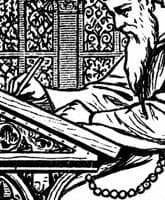Author of Beowulf
Critique

Medieval writer in 1877 illustration
Born
Unknown
Died
Unknown
Places lived
Anglo-Saxon England; other unknown
Publication
Poetry
Genres
Literary, epic, mythology, adventure
Writing language
Old English
Searching for the Beowulf author(s)
"Anonymous" of course means "without a name" and is used when the author is not known—or sometimes, as in the case of Beowulf, when a story develops out of an oral tradition over generations with possibly many storytellers contributing to and revising the tale before it is finally written down and becomes literature.
The tales of Beowulf take place mainly in what we now call Sweden and Denmark, and may indeed have originated in that area. If so, they must have passed with settlers into Britain. It is on that isle it is thought to have achieved its epic form and it was preserved in literary form
The oldest surviving manuscript of Beowulf in Old English dates from about 1000 CE. But the epic poem may have been first recorded earlier and much of the story composed well before that.
One bit of evidence for the earlier date is that the poem refers to the Christian God while retaining many pagan elements. The telling of the story is Christian while the characters and the storyline are obviously not—as if the poet was trying to understand a pagan story in Christian terms. For example, the author seems to go out of his way to describe the heathen rituals used unsuccessfully to ward off monsters before the hero Beowulf comes to the rescue.
This would tend to place the work in a transitional period, somewhere from the mid-600s into the 700s, when the Anglo-Saxons in England were converted to Christianity but when they still remembered their pre-Christian past. It's supported by some information in the poem about burial practices that archeologists date back to the sixth and seventh centuries.
One or more writers
Some scholars however prefer a later date, as late as 950, basing their views on the politics of the piece. It has even been suggested the earliest manuscript we have (see picture on the Beowulf page), dated from around 1000 CE, is actually a copy from the hand of the original author.
It has also long been debated whether Beowulf was composed mainly by one or by several medieval poets in England.
The argument for a single author holds that Beowulf is so different from other Old English poetry of the time that it must have been the work of a single creative, innovative mind. On the other hand, its difference from other poetry in England at the time may be attributed to it having been written to appeal to the Viking settlers and conquerors who were coming to dominate the previous Anglo-Saxon majority.
Scholars also contend over where in England the poet who first set down Beowulf in writing lived. The leading Anglo-Saxon kingdoms in the 700s with the sophistication to support such culture included Mercia, Northumbria and East Anglia. The poem is thought to have been later refined in Wessex.
The author of Beowulf then was one or more creative geniuses practising the poetic craft in a cultured Anglo-Saxon kingdom of England around the seventh century or later. That's about all we know. Anonymous.
— Eric
Critique

